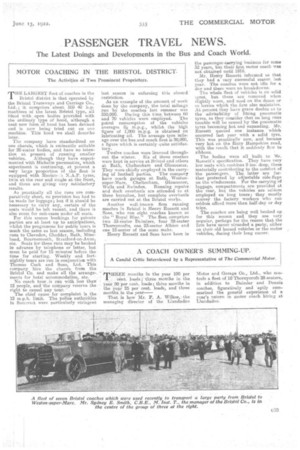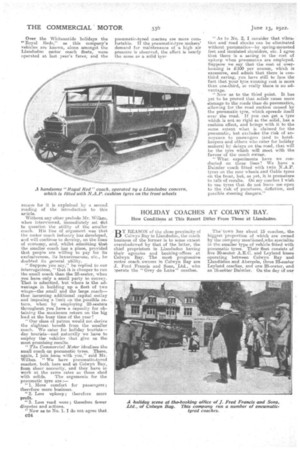A COACH OWNER'S SUMMING-UP.
Page 21

Page 22

If you've noticed an error in this article please click here to report it so we can fix it.
A Candid Critic Interviewed by a Representative of The Commercial Motor.
THREE months in the year 100 per 'cent. loads; • three months in the year,.51? per cent, loads; thee months in the year 25 per cent. loads, and three months in the year— That is how Mr. F. A. Wilkes the managing director of the Llandudno
Motor and Garage Co., Ltd., who controls a fleet of 10 Thornycroft 28-seaters, in addition to Daintier and Dennis coaches, figuratively and aptly summarized the general experience of a year's return in motor coach hiring at Llandudn o. Over the Whitsuntide holidays the "Royal Reds," as this company's vehicles are known, alone amongst the Llandudno motor coach fleets, were operated at last year's fares; and the reason for it is explained by a second reading of the introduction to this article.
Without any other prelude Mr. 'Wilkes, when interviewed, immediately set dut to question the utility of the smaller coach. His line of argument was that the motor coach industry has developed, and will continue to develop, on the lines of economy, and, whilst admitting that the smaller coach has a place, provided that people are willing to pay for its exclusiveness, its luxuriousness, etc., he doubted As general utility.
" Suppose you say," he replied to our interrogations, " that it is cheaper to run the small coach than the 28-seater, wheu you have only a small party to convey. That is admitted, but where is the .advantage in building up a :fleet of two wings—the small and the large coach— thus incurring additional capital outlay and imposing a limit on the..possible ree turn, when by employing 28-seaters throughout you have a eapacity for obtaining the maximum return on the big load at the busy time of the year?
" Our class of patron would not derive the slightest benefit from the smaller coach. We eater for holiday tourists— day tourists—and naturally we have to employ the vehicles that give us the most premising results.
"The Commercial Motor idealizes the small coach On pneumatic tyres. There, again, I join issue with you," said Mr. Wilkes. "We have pneumatie-tyred coaches, both here and at Colwyn Bay, from sheer necessity, and they have to work at the same rates no those shod
with solids. The arguments for the pneumatic tyre axe:— " 1. More comfort for passengers; therefore more business.
"2. Less -upkeep ; therefore more profit.
"3. Less road wear ; therefore fewer disputes and actions.
"Now as to No. 1. I do not agree that 024 pneumaticetyred coaches are more comfortable. If the pneumatic-tyre makers' demand for maintenance of a high air pressure is observed, the effect is nearly the same as a solid tyre
"As to No. 2, I Consider that vibration and' road shocks can be eliminated without. pneumatics—by spring-mounted feet and insulated shoulders, etc. I agree that there is a saving in the cost of upkeep when pneumatics are employed. Supprese we -say that the -cost of overhauling is 11:10 per annum, which is excessive, and admit that there is onethird saving, you have still to face the fact that your tyre running cost is more than one-third, so rally there is no advantage.
" Now as to the third point. IL has yet to be proved that solids cause more damage to the roads than do pnemnatics, allowing for the road suction caused by the pneumatic tyre, which spreads itself over the road. If you can get a tyre which is not so rigid as the solid, has a cuthien effect, and brings with it to the same extent what is claim-ed for the pneumatic, but excludes the risk of annoyance, to passengers (and to hotelkeepers and others who cater for holiday makers) by delays on the road, that will
be the tyre which meet with the favour of the coach owner.
" What. experiments have we conducted on these lines? We have a Daimler coach fitted with twin N.A.P. tyres on the rear wheels and Gable tyres on the front, but, as yet, it is premature to talk of results. 0-n my coaches I wish to use telrres that do not leave me open to the risk of punctures, deflation, and possible steering dangers."


































